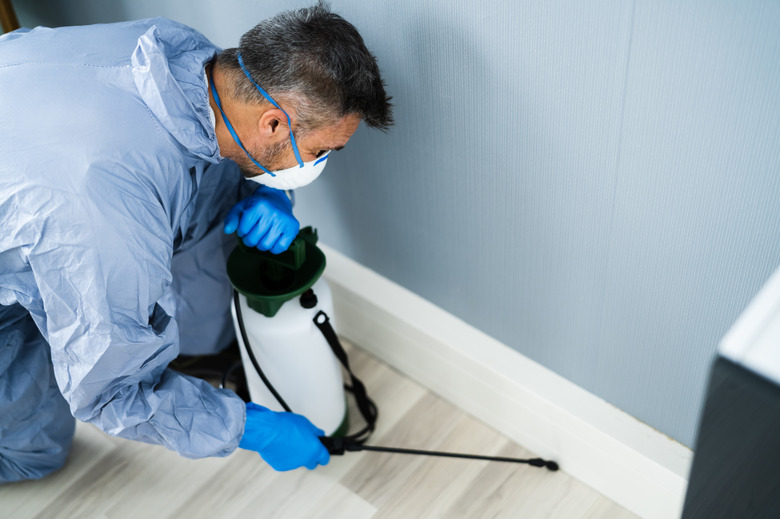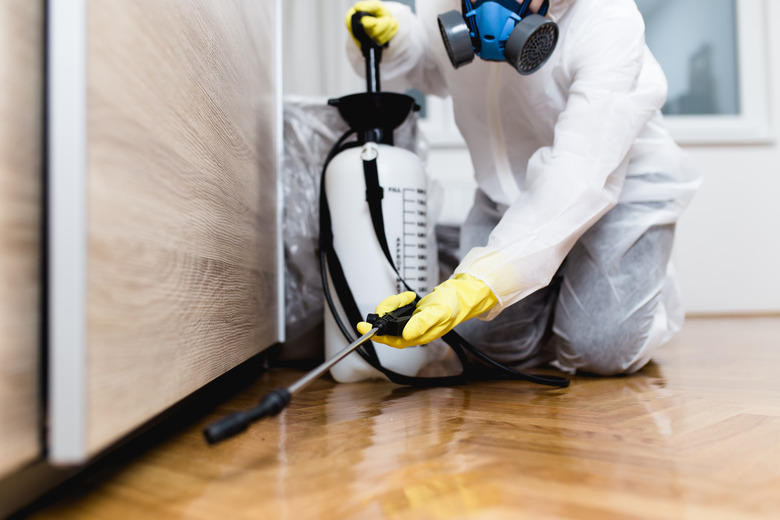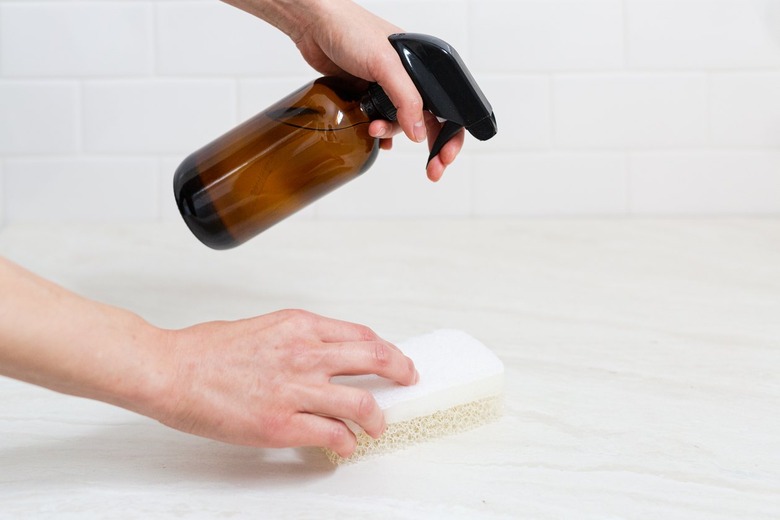Are Pest Control Services Worth The Money?
We may receive a commission on purchases made from links.
It's possible that one pest spotted in your home may in fact be one of an entire army behind the baseboards — but is a professional pest control service going to be worth the money you could wind up spending for the problem? The answer, of course, is that it depends.
Some folks are cucumber-cool when cockroaches come out of nowhere and furry mice play luge at the edge of the room. The rest of us, however, are standing on whatever furniture that happens to be nearby and ready to fumigate the entire house. But how exactly do you know whether you have a full-on infestation that warrants professional extermination or if it's just a pest problem you can handle yourself? Your answer will vary depending on what type of pest you're dealing with, whether you want to use strong pesticides to eliminate the problem, and just how squeamish you are when it comes to DIY pest control methods.
Unsure of whether it's worth it to spend the money on professional pest control? Here are some factors to consider.
Tip
Some pest control situations demand the help of professional technicians — like a full-on infestation. If your home's structure is being compromised, or a pest is so invasive that it's a danger to your health, it's best to call in a pro.
When Is Using Professional Pest Control Necessary?
When Is Using Professional Pest Control Necessary?
Having pesticides routinely applied in your home is generally not a good idea unless a nonchemical approach has failed to control the situation, but unfortunately, there are times when you have no choice but to pull out all the stops by calling in the pros. Essentially, if you're dealing with pests that cause damage to your home, spread disease, or bite, you should bypass the DIY approach and call for professional pest control.
Unwelcome wildlife can wiggle in where they don't belong and cause extensive destruction. Pesky termites gorge on cellulose and wood, even making meals of furniture, ceiling beams and hardwood floors. They can completely destroy a house with their presence undetected until it's too late. Carpenter ants tunnel through wood, and raccoons, rats and mice damage HVAC, electrical, drywall, insulation, walls and roofs.
In addition to causing structural damage, some pests bite, and others spread disease. Fire ants deliver painful bites that itch and form blisters. Cockroaches contaminate food, transmit diseases and trigger allergies and asthma attacks. In certain areas, mosquitoes carry the West Nile virus, Zika virus, malaria, dengue fever, and encephalitis.
Perhaps one of the most serious concerns is the hantavirus that spreads through mouse feces and urine. It's possible to contract it simply by sweeping droppings and inhaling the dust. The rapidly progressing infection can lead to the extremely serious and potentially fatal hantavirus pulmonary syndrome. There is no treatment or cure, which is a good justification for seeking professional pest management as soon as you see a mouse.
What Pest Control Services Offer
What Pest Control Services Offer
Professional pest control is more than just swatting at a few insects or finding the nest — it's a full-fledged pest extermination plan.
- First, before presenting a treatment plan, reputable pest control companies will perform an inspection of your property (one much more thorough than one done by the average homeowner).
- Second, they form a treatment plan that can involve anything from a one-time spray or trap placement all the way up to tenting and fumigating your house.
- Finally, they treat the problem, establish protection
against future pest infestations and follow up with bimonthly or quarterly pest control visits.
Pest control companies typically offer basic plans for roaches, ants, and mice along with services focusing on ticks and mosquitoes. Specialty services will target more invasive and hard-to-get-rid-of pests like bedbugs and termites. But before you hire a pest control service, keep this in mind: Not all pest control services handle all types of infestations. Some don't handle wildlife and destructive animals, like opossums and raccoons. As best as you can, try to identify the type of pest before the pest control company comes out so you can target the right companies in your search.
How Much Is Professional Pest Control?
How Much Is Professional Pest Control?
What you pay for professional pest control will depend on the type of household pest, the extent of the infestation, how many treatments are needed, and the size of your home. Although some problems, like bedbugs and bees, are remedied with one visit, other pests persistently return, requiring ongoing treatment.
According to HomeAdvisor, even though a typical range for pest control service is $111 to $261 with an average of $176, costs can vary greatly depending on the type of pest and the treatment approach needed. Roach fumigation runs $100 to $400, ant extermination can be $80 to $500, termite control ranges from $500 to $3,000, and treatment for bedbugs can cost $300 to $5,000. (The higher prices usually relate to tenting or fumigating houses.)
Many pest control companies offer guarantees, especially for pests that don't like to surrender, like termites. Be sure you understand the terms of the guarantee before you sign any contract. Check on whether they cover damages that occur after ineffective treatment and whether there's a charge for annual inspection. Some companies offer to return at no cost between regularly scheduled visits if the pests reappear.
When you start shopping for a service, get several estimates and above all, don't be shy about asking for references and proof of both a business license and technician certification. Request labels for products they plan to use along with information on the planned application rate. For extra due diligence, call your local university extension service to confirm the appropriateness of the product for your problem.
The Dangers of Pesticides
The Dangers of Pesticides
When you hire a professional exterminator, it's likely they're going to use industrial-strength pesticides that will eliminate your pest problem quickly. Before you hire a company, you should definitely do a risk-benefit analysis of being exposed to these chemicals versus eliminating the pests on your own.
The effects on our health from exposure to pesticides have long been a concern. The EPA specifically notes the agency's concern over the possibility of increased risk of cancer and long-term damage to the liver and central nervous system from exposure to ingredients in pesticides like cyclodienes. The agency's list of possible issues resulting from exposure to a range of pesticides includes:
- Increased cancer risk
- Damage to kidneys and central nervous system
- Eye, nose, and throat irritation
- Liver damage
- Endocrine and nervous system damage
Potential symptoms include:
- Headache
- Dizziness
- Muscle weakness
- Nausea
- Muscle twitching
- Tingling sensations
Many pest control companies now claim to offer green pest-control packages using products derived from plants, flowers, and other natural earth elements, but a 2021 Washington Post report advised being wary of pest control companies touting a green approach — noting that many actually use only conventional treatments. Before going with a company making such promises, request ingredient information and then call your local university extension office for clarification about the product's safety and likelihood of effectiveness.
If you're concerned about the chemicals used during a pest removal, many companies — in addition to promoting prevention and utilizing chemicals and traps — follow the recommendation of the Environmental Protection Agency (EPA) by practicing integrated pest management, which minimizes the use of chemical pesticides by improving sanitation practices and establishing physical barriers.
DIY vs. Professional Pest Control
DIY vs. Professional Pest Control
It can be tempting to save money and avoid exposure to dangerous pesticides by choosing to go with a DIY pest control method — and sometimes it works. There's a lot of information and advice to be found on how to tackle pests on your own. Some are effective, and some are not. Some are safe, and some are not. If your problem isn't a serious infestation demanding immediate attention to head off health problems and property damage, you may want to give it a shot.
Natural repellents may not be as effective as commercial pesticides, however; it depends on the problem and the extent of the infestation. And, obtaining and handling professional-grade pesticides on your own can create serious problems and can often do more harm than good. If your eco-friendly natural approach doesn't work, it may be prudent to place that call.
Reputable pest control companies, especially the better-known services, employ well-trained technicians who apply professional-grade products that homeowners can't buy. They know how to apply them and how often. On your own, you're just guessing, and DIY efforts don't come with a guarantee.
Prevent a Pest Problem in the First Place
Prevent a Pest Problem in the First Place
Given the dangers inherent in pesticides and the disease and destruction that some pests bring, doing everything you can to prevent problems from the start will be worth the time and possible inconvenience. Such preventative measures include eliminating what may attract certain types of pests: food matter, water, and any possible shelter spots. It can be inconvenient and time-consuming, but prevention ultimately brings peace of mind.
Here are some ways to eliminate pests from entering your home in the first place:
- Wash and dry your dishes immediately after meals and never leave food on your countertops.
- Don't allow scraps to collect in your garbage disposal, which should be regularly cleaned and deodorized.
- Food should
be stored in either glass containers or sealable plastic bags, and food waste
should be sealed and stashed in garbage cans with tight lids. - Move trash from your kitchen garbage can to your outdoor garbage can daily and don't fail to
move those cans to the street before every scheduled pickup day. If possible, find a spot for your outdoor garbage can that isn't too close to entrances near your kitchen. - Eradicate plumbing leaks and check for water accumulation beneath your refrigerator and in other likely
spots. - Put pet food and water away at night and clean around and inside your toilet regularly.
- Remove clutter that creates hiding
places and eliminate openings that create entry points. - Never bring packages and
cardboard boxes inside without checking them thoroughly for pests, even if this means opening deliveries outside. - Consider never buying used furniture again. Bedbugs, for example,
live not only in upholstery but also in wood furniture. - Outside your house, eliminate any clutter that gives them shelter and spots to colonize, like woodpiles and debris.
- Maintain your lawn and keep shrubs and plants trimmed away from your house and foundation.
References
- United States Environmental Protection Agency: Do's and Don'ts of Pest Control
- United States Environmental Protection Agency: Tips for Selecting a Pest Control Service
- United States Environmental Protection Agency: Pesticides' Impact on Indoor Air Quality
- HomeAdvisor: How Much Does an Exterminator Cost?
- National Pesticide Information Center: Professional Pest Control
- National Pesticide Information Center: Pesticide Home Remedies
- Northwest Exterminating: Is Pest Control Worth It?
- PestWorld.org: Health Hazards Posed by Rodents
- ConsumersAdvocate.org: Is Preventative Pest Control Worth It?
- The Washington Post: Many Companies Advertise "Green" Pest Control. But Is it Possible? And Does it Work?
- Just Wood Furniture: Can Bed Bugs Live, Hide, and Lay Eggs in Wood Furniture and How to Check?


